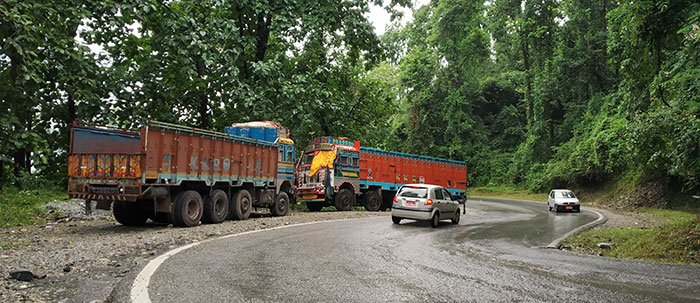Rajesh Rai | Phuentsholing
While some of the key sectors that contribute to the country’s economy are down amidst the Covid-19 outbreak, industries in Pasakha, despite tremendous challenges, have not ceased to function.
A Standard Operating Procedure (SoP) was initiated to give safety the highest priority while the industries keep operating.
Starting from trucks entering into Phuentsholing until reaching Pasakha and then heading back and exiting the commercial town, the SoP ensures everything is under control.
There are two mobile surveillances that monitor vehicle movements continuously en route to Pasakha industrial estate. These surveillance teams make sure the vehicles do not stop on the way and that the drivers do not come out in the open, even if there are breakdowns. Trucks are also not allowed to stop for fuel. The monitoring is carried continuously in shift systems.
All the factories have also established their own quarantine centres even before the trucks were allowed following the lockdown in India. Drivers and their assistance use the facilities so that there is no contact with the locals. Food and refreshment are provided to drivers and their helpers.
The president of the Association of Bhutanese Industries (ABI), Pema Tenzin said that the paramount objective was to prevent the drivers and their helpers ferrying industrial goods to Pasakha from having physical contact with the locals.
“We would like to thank our government and the government of India going out of their way to support us,” he said, adding that the industrial raw materials were smoothly coming into Bhutan despite hurdles.
“This is phenomenal.”
However, considering the overall impact of the Covid-19, business is still down with just minimal consignments making their way out. On an average, about 20-30 trucks make movement a day.
Although the raw materials are coming in and manufacturing continued, dispatches are affected with the lockdown in India, which have then distressed the funds and working capital, ABI president said. The industries have appraised the government to facilitate additional working capital so that the industries can continue manufacturing, he said, explaining the products could be stocked and dispatched later when normalcy returns.
Industries in Pasakha and Phuentsholing employ more than 3,000 Bhutanese. All are still working and paid. Non-Bhutanese working in the factories are staying within the factory premises and are not allowed to go across the border. Once they leave, they are not allowed to come in.
Pasakha industries are also contributing manpower to the patrol teams along the border areas. This has also caused a “slight” shortage in the industries, ABI hinted.
Ferrosilicon is the key export commodity from the industries and it is one of the top 10 exported commodities. Ferrosilicon was the country’s top export commodity in 2018 with export worth Nu 13B.


